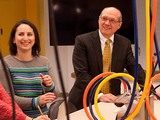STEM BUILD@UMBC initiative part of $240 million NIH program
Faculty researchers, administrators, and staff across UMBC cheered when the National Institutes of Health (NIH) announced by teleconference on October 22, 2014, a groundbreaking series of awards for the university. NIH has granted UMBC over $18 million to create a national model of comprehensive support to expand and increase the success of students seeking degrees in the sciences, technology, engineering and math (STEM).
This funding is part of a $240 million, five-year NIH investment to enhance diversity in the biomedical research workforce. Ten projects across the United States were awarded Building Infrastructure Leading to Diversity (BUILD) grants, including the STEM BUILD@UMBC initiative. This initiative includes collaborations with five community colleges, Gallaudet University, and the University of Maryland School of Medicine.
The STEM BUILD@UMBC initiative combines innovation with leveraging effective components of existing UMBC programs to create a multifaceted new student support model. It builds on the best that UMBC has to offer, from the supportive peer networks of our living-learning communities to the applied learning and internship placements of the Shriver Center. The initiative pulls in the rigorous undergraduate research preparation that is a hallmark of the MARC U*STAR program, McNair Scholars Program, and our partnership with the Howard Hughes Medical Institute. It expands the community college partnerships of the Gates STEM Transfer Student Success Initiative and the proactive mentorship of the Meyerhoff Scholars Program, and much more.
Bill LaCourse, dean of the College of Natural and Mathematical Sciences, and UMBC Provost Philip Rous, together serve as the award’s principal investigators and will direct the STEM BUILD@UMBC initiative.
“At UMBC, we believe large numbers of students from all backgrounds have the potential to excel in the sciences,” shares Bill LaCourse. “Through a university culture that values both innovation and assessment, we’re constantly developing more effective ways to support learning and degree completion, building on the diverse strengths our students bring to the table.”
Philip Rous shares, “This award recognizes the commitment of our faculty and staff and their demonstrated record of achievement in supporting the success of all students. It recognizes our ability to develop transformational initiatives that have a profound impact on the lives of our students and also serve as national models of student support.”
Unlike programs that focus on supporting students at extreme ends of the achievement curve, STEM BUILD@UMBC will focus on high-potential students who are at risk for not completing their STEM degrees but who, with extra support, are likely to succeed.
After a planning period, the program will launch with 20 BUILD Trainees from UMBC and 18 BUILD Affiliates from collaborating institutions and grow to provide direct support to a total of 80 trainees and 72 affiliates. Hundreds of additional undergraduates will benefit indirectly from BUILD initiatives that expand UMBC’s STEM success infrastructure, including new active learning courses, student professional development workshops, faculty training opportunities, a STEM milestone certificate, and group research experiences. The program will seek to establish a model that can be implemented on a national scale.
A White House College Opportunity Initiative workshop held September 16, 2014, at UMBC revealed a real hunger for well-evaluated approaches to improving STEM education nationwide, as many other universities struggle with lagging retention rates and achievement gaps, particularly in STEM. Building on momentum from President Obama’s College Opportunity Summit, the workshop engaged education leaders in discussing ways to improve STEM teaching and learning, to make STEM degrees more accessible to underrepresented students, and to increase degree completion and the production of highly skilled professionals in STEM areas.
STEM BUILD@UMBC directly responds to the concerns of top education leaders and the workforce needs identified by the President’s Council of Advisors on Science and Technology. The initiative represents an exciting step forward in developing an effective model to boost the success of more students in STEM and in all fields, at UMBC and nationwide.
Pictured: Dr. Bill LaCourse, Dean of the UMBC College of Natural and Mathematical Sciences and Co-Principal Investigator on the STEM BUILD@UMBC NIH award
Tags:
Posted: October 22, 2014, 3:33 PM
